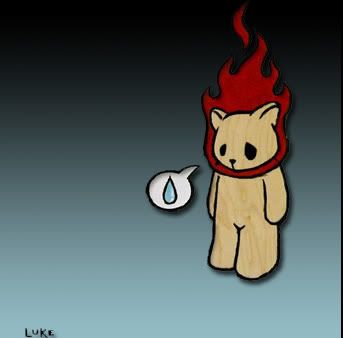Such A Twat
And be prepared, I might also post the short story I'm writing if I actually am bothered to get around it sometimes soon.
Developing a Philosophy of Counseling
1. What is your view of human nature? How is this point of view significant in terms of your philosophy of counseling? What factors account for changes in behavior?
My view on human nature is that we are alike and possess such innate characteristic such as joy and pain. The only thing that differentiates us is our life experience which will shape our outlook on life depending on how we learnt to deal with each event that occurs in the course of growing up. And I do believe the environment and problems one face with greatly shape how a human would be like in the near future. And because most of us fail to cope or understand the matters at hand, it makes us imperfect in the sense that we become selfish in order to gain the upper hand of perfection and also in becoming more skeptical towards others because we relate human being to being selfish in the first place. I believe that all humans tend to build a mask to protect what they truly feel inside in order not to feel weak or vulnerable and this point of view will make me aware that when clients come in for a counseling session, they might not show their own true self or will try to hide something they think is embarrassing that might have been the cause of the mental problem in the first place. I feel that environment changes, self realization and social pressure are what accounts for changes in behavior.
2. What is your definition of counseling? How would you explain a prospective client what counseling is about?
My definition of counseling is that it is a therapeutic session designed to help a client cope with the emotional problem that they face over some issues that they can’t resolve without a clear provided direction. I would explain to a prospective client that counseling is simply about a chance for them to talk about any issues that they have in mind and can’t seem to see a solution to it and we’re here to make sense of those feelings and hopefully finds a way for them to cope or solve that problem.
3. What goals of counseling do you view as appropriate? What are some inappropriate goals?
The goal of counseling I view as appropriate is when clients are able to grasp the degree of their problems and that they are able to find that ray of light, the silver lining in the grey sky. The ultimate goal is to achieve or at least move towards the goal that we have set with the client before the counseling began, the condition he wishes to be in by the end of our counseling period. Inappropriate goals of counseling would be when we try to persuade a client to take to our point of view when it comes to handling their problems or when our own self interest in a client takes our counseling to that path because we already crossed the line of professionalism and that is unethical.
4. What are the most important functions of a counselor or therapist? How would you define your own role as a helper?
The most important functions of a counselor are to provide some sort of guidance or become the power of reasoning in the relationship of a counselor and client. They must be able to maintain an optimistic outlook and become that a client can depend upon to help them. I would define my own role as a ‘friend’ who is playing an active listening role and is not trying to give out any advice or criticism but instead provide the client with a different and a more positive view of their current situation while being conscious and responsible for what we say and do.
5. What do you think are the essential characteristics of an effective relationship between the client and the therapist? How important is this relationship as a factor of change?
To establish an effective relationship between a client and a therapist, I feel that we need trust, openness, respect and understanding to take the relationship to another level that I think we need to get before a good counseling session can begin. When a counselor shows that he or she can be trusted by developing a sense of respect and openness in the counselor’s view and opinion towards the client, it will be easier for the client to open up to his or her problems. When the client strips down to their actual self and not hiding behind a mask, they will be honest about what they reveal and with that the counselor would have a better chance of moving the client towards a goal they had set before the session. As the ultimate goal in counseling is for the client to cope or resolve their problems on their own terms, an effective relationship plays a role in achieving this goal. Without a strong foundation in the relationship of the counselor and client, the progress of moving towards achieving their goals would be severely slow and limited.





0 Comments:
Post a Comment
<< Home